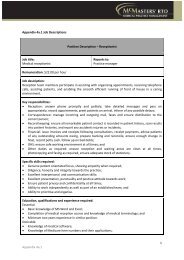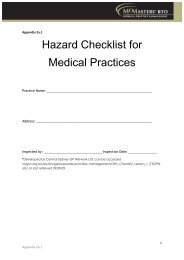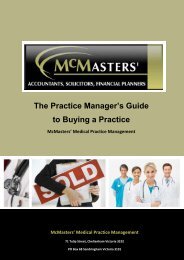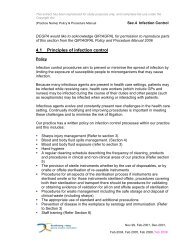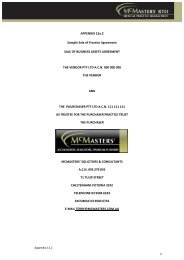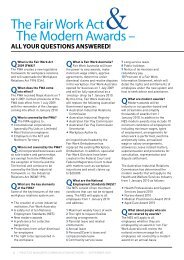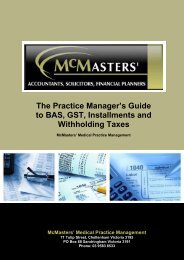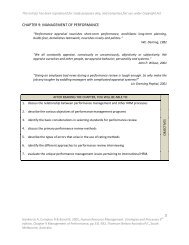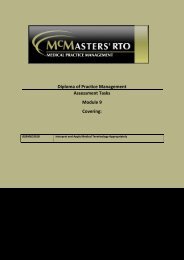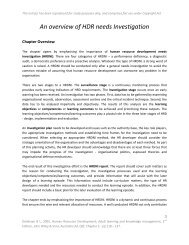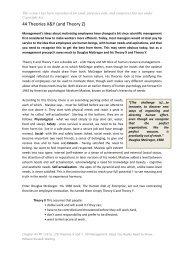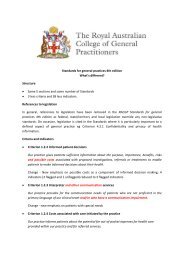The Practice Manager's Guide to Time Management
The Practice Manager's Guide to Time Management
The Practice Manager's Guide to Time Management
You also want an ePaper? Increase the reach of your titles
YUMPU automatically turns print PDFs into web optimized ePapers that Google loves.
thoughts on the matters at hand will minimise wasted time in a busy schedule. <strong>The</strong> “minimum” is, ofcourse, a personal thing, and taking this tactic <strong>to</strong>o far can lead <strong>to</strong> loneliness and isolation.Socialisation is a work place lubricant that helps create and maintain good relationships with peers,staff and patients.In finding the right balance, it is relevant <strong>to</strong> bear in mind that studies have shown more than a thirdof an executive’s time can be spent on non-business interactions. In professions where time ismoney, and time is scarce, this sort of pattern is not acceptable, and leads <strong>to</strong> sub-optimalperformance. Doc<strong>to</strong>rs need <strong>to</strong> learn how <strong>to</strong> curtail lengthy interactions firmly, but with tact. Doc<strong>to</strong>rsand managers should not feel every personal reference requires a response from them. Avoidemploying overly social people, (or timewasters): actually ask about this when checking references.Whilst it is critical for staff <strong>to</strong> have good communication skills, and it is commendable for them <strong>to</strong>have the ability <strong>to</strong> socialise well with other staff, a balance is necessary in order for the practice <strong>to</strong>run efficiently.<strong>The</strong> practice manager should enforce a work-focused culture and always lead by example when itcomes <strong>to</strong> socialisation in the work place. Well-developed social skills do not include chatterboxtendencies. Every time a staff member spends five minutes regaling someone else with the s<strong>to</strong>ry oftheir weekend, the practitioner can lose valuable staff time. This costs money and, can also cost thepractitioner time.A note <strong>to</strong> practice managers<strong>The</strong> role of the practice manager is unique, as the principals of the practice entrust practicemanagers with the all non clinical aspects of managing a medical practice. <strong>Practice</strong> managers are‘agents’ of the principal doc<strong>to</strong>rs, and act as their eyes and ears when the doc<strong>to</strong>rs are busy treatingpatients. <strong>The</strong> core of the relationship between the principal doc<strong>to</strong>rs is one of utmost trust andconfidence, and this should be recognised by the practice manager and doc<strong>to</strong>rs at all times.<strong>Practice</strong> managers should do everything in their power <strong>to</strong> free the doc<strong>to</strong>r’s time. It is important thatthe role of the practice manager is defined, and that the principals of the practice outline theboundaries of the practice manager’s authority. With time and experience, the practice managershould determine which matters the doc<strong>to</strong>r wants <strong>to</strong> delegate, and which matters the doc<strong>to</strong>r prefers<strong>to</strong> deal with personally. For example, some doc<strong>to</strong>rs involve their practice manager with theirpersonal finances, bookkeeping and taxation matters, whilst others keep personal affairs strictly ou<strong>to</strong>f the medical practice.<strong>Practice</strong> managers should also remember that their own time is valuable and delegate all noncomplexadministrative tasks <strong>to</strong> other lower paid staff. As the practice manager is the highest paidnon clinical staff member, it is important that they spend their time only with matters which noother administrative staff can handle. This approach will ensure that the wage paid <strong>to</strong> the practicemanager is utilised most effectively and that the practice receives value for their investment in thepractice manager.13



